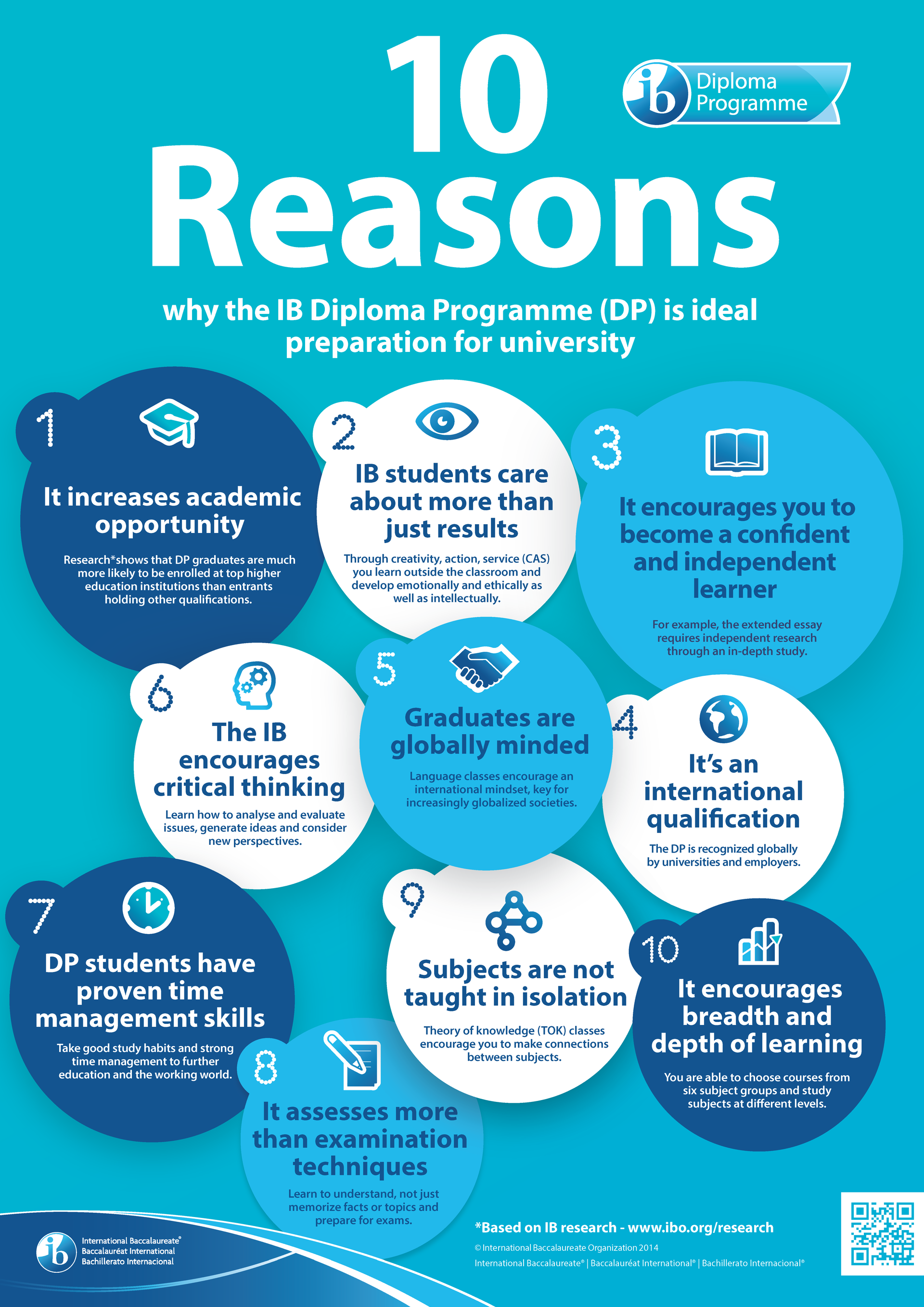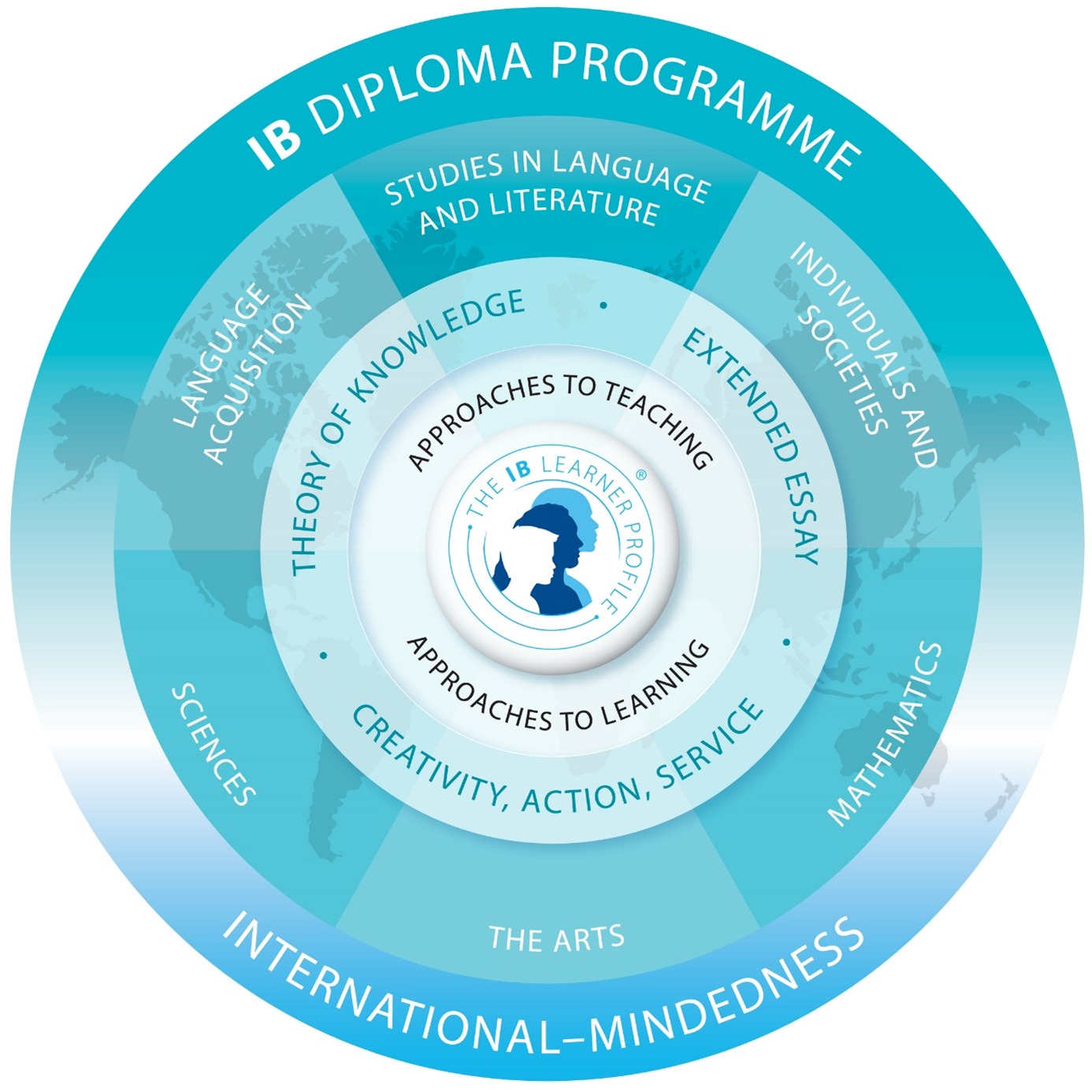DP — General Information

IB Diploma Programme — General Information
The IB Diploma Programme is designed as an academically challenging and balanced programme of education that prepares students, normally aged 16 to 19, for success at university and life beyond. The programme is taught over two years and has gained recognition and respect from the world´s leading universities.

The Curriculum
IB Diploma Programme students study six courses at either higher level or standard level. Students must choose one subject from each of groups 1 to 5, thus ensuring breadth of experience in languages, social studies, the experimental sciences and mathematics. The sixth subject may be an arts subject chosen from the group 6, or the student may choose another subject from group 1 to 5.
In addition the programme has three core requirements that are included to broaden the educational experience and challenge students to apply their knowledge and understanding.
The extended essay is a requirement for students to engage in independent research through an indepth study of a question relating to one of the subjects they are studying.
Theory of knowledge is a course designed to encourage each student to reflect on the nature of knowledge.
Creativity, activity, service requires that the students actively learn from the experience of doing real tasks beyond the classroom. Students can combine all three components or do activities related to each one of them separately.
The curriculum is modelled by a hexagon with six academic areas surrounding the central core requirements.

Over the course of the two-year programme, students:
- Study six subjects chosen from the six subject groups
- Participate in Creativity, activity, service
- Follow the course of Theory of Knowledge
- Complete an Extended Essay
Through the Diploma Programme (DP) Core students reflect on the nature of knowledge, complete independent research and undertake a project that often involves community service.
Normally:
- Three of the six subjects are studied at higher level (course representing 240 teaching hours)
- The reaining three subjects are studied at standard level (course representing 150 teaching hours)
Subjects, other than languages, are taught and examined in English language.
School Mission Statement
We strive to prepare all students to become life-long learners and responsible citizens both locally and globally ready to meet the challenges of the future. In partnership with families and community, our goal is to create relevant learning opportunities for students — both inside and outside the classroom — that help them develop the knowledge, critical thinking skills and character necessary to succeed in a technologically advanced world.
- — Approved by the school teachers, 29/03/2022
SUBJECT OFFER
IB DIPLOMA PROGRAMME
GYMNÁZIUM ŠROBÁROVA 1, KOŠICE
Academic Year 2023/2024
Group 1 — Studies in language & literature
- English A: Language & Literature SL, HL
- Slovak A: Literature SL, HL
Group 2 — Language acquisition
- English B SL
- German B SL
- French B SL
Group 3 — Individuals & Societies
- Geography SL, HL
- History SL, HL
Group 4 — Sciences
- Physics SL, HL
- Biology SL, HL
- Chemistry SL, HL
Group 5 — Mathematics
- Applications & Interpretations SL, HL
Group 6 — The Arts
- Visual Arts SL
Theory of Knowledge
CAS
EE (Extended Essay)
The higher level classes (HL) will occupy 5 periods per week.
The standard level classes (SL) will occupy 3 or 4 periods per week.
TOK will be taught 2 periods a week over 2 years.
CAS activities will occupy one half-day per week.
In addition to completing the six subjects, The Diploma candidate must meet the following requirements:
- Extended Essay
Complete a substantial piece of independent, self-directed piece of research work under the supervision of a qualified teacher at the school in one of the subjects of the IB curriculum and submit it as an 4 000-word Extended Essay that meets general and subject-specific criteria. Assessed externally by examiners appointed by the IB. - Theory of Knowledge (TOK)
Follow a course of TOK occupying minimum 100 hours over the two-year programme. The TOK course is assessed through an oral presentation and a 1 600 words essay. The presentation assesses the ability of the student to apply the TOK thinking to a real-life situation while the essay takes a more conceptual starting point. Assessed externally by examiners appointed by the IB. - Creativity, Activity, Service (CAS) Engage in some form of extra-curricular activity. The tree strands of CAS are charcterized as follows: Creativity: arts and other experiences that involve creative thinking Activity: physical exertion that contributes to a healthy lifestyle, complementing academic work elsewhere in the DP Service: an unpaid and voluntary exchange that has a learning benefit for the student. The rights, dignity and autonomy of all those involved are respected. At leat the equivalent of one half-day per week is available to all candidates throughout the two-year course. It is not formally assessed. However, students reflect on their CAS experience as part of the DP and provide evidence of achieving the seven learning outcomes for CAS.
Assessment
Students take written examinations at the end of the programme, which are marked by external IB examiners. Students also complete assessment tasks in the school, which are either initially marked by teachers and then moderated by external moderators or sent directly to external examiners.
Marking
Performance in each subject is graded on a scale of 1 point (minimum) to 7 points (maximum). For the IB diploma, a maximum of 3 points is awarded for combined performance in theory of knowledge and the extended essay. The maximum total Diploma Programme points score is 45.
The grading scheme in use is as follows:
The award of the final grade after IB graduation exams in each subject is the responsibility of the IB Final Award Committee.
Failing conditions
- CAS requirements have not been met
- Candidate´s total points are fewer than 24
- An N has been given for Theory of Knowledge, Extended Essay or for a contributing subject
- A grade E has been awarded for one or both Theory of Knowledge and Extended Essay
- There is a grade 1 awarded in a subject/level
- Grade 2 has been awarded three or more times (SL/HL)
- Grade 3 has been awarded four or more times
- Candidate has gained fewer than 12 points on HL subjects (for candidates who register for four HL subjects the three highest grades count)
- Candidate has gained fewer than 9 points on SL subjects (candidates who register for two SL subjects must gain at least 5 points at SL)
Please acknowledge that even without negative grade or with 24 points achieved you may still not receive the IB Diploma due to specific failing conditions.





